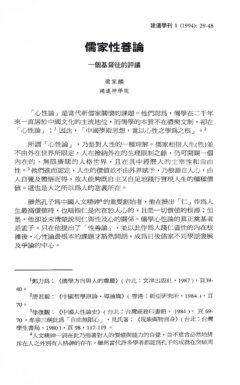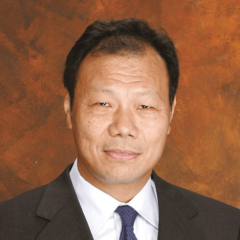儒家性善論:一個基督徒的評議 / 梁家麟
撮要
「性善論」不是孔、孟二人學說的起點,反倒只是他們的「人皆可以爲堯舜」的信念的一個必要的前設,而後者才是儒學理論的起點。孟子相信,惟有肯定人性本善,才能保證人有爲善的能力。人性的「善」不是在實踐意義中的「事善」,而只是本體上的「體善」,故二者的含義不盡相同。性善論是一個無法被證實的前設。孟子企圖藉訴諸人的當下良心自覺來證明人性本善的做法,是困難重重的。不過,這個做法倒顯示了儒家其實是將「善」放在人的主觀意願(心)而非客觀實況之上。事實上,孟子關懷的重點並不在於人事實爲善與否,而只是說人有可以爲善的潛能,故此是從人的理想層面而立論的。因此,我們不能藉現實上的人的不善來否證性善說。作爲一個主觀願望,性善是無法被駁倒的。由於性善說關注的不是人的實況,而只是人的可能實現的理想,故與基督敎之指出人實然爲罪人不相衝突。性善說與基督敎眞正相衝突的地方,在於前者相信人不管如何實然敗壞,只要有爲善的意向,便可以自力成爲善人。但基督敎則不認爲人只要有向善的決心與知善的能力,便能在行爲上行善。故此,眞正的差異是自力得救抑或他力得救。筆者最後建議將儒家「性善論」視作敎育哲學的一種主張,並且拒絕當代新儒家的努力將之打扮成次宗敎的做法;若非如此, 基督敎與儒家思想將無對話的餘地。
ABSTRACT
The doctrine of the goodness of human nature is not the starting point of Confucius’ and Mencius’ thinking but rather the presupposition of their conception that “all can become Yao and Shun, i.e. the saints.” It is that conception that constitutes the starting point of Confucianism. Mencius believes that only in the affirmation of the goodness of human nature, can one then confirm the ability to do good.
The goodness of human nature is the ontological good and not the actuality of doing good; the two are not the same. The intrinsic goodness of human nature is a presupposition that cannot be proven. That Mencius intended to prove the goodness of human nature through conscientiousness is problematic. But his approach implies that Confucianism places the goodness of human nature within the individual’s subjective intention (heart), rather than in the objective reality. In fact, Mencius emphasizes the potentiality and not the actuality of the goodness of human nature, thus establishing his argument in the idealized plane. Consequently, we cannot prove goodness of human nature in the objective reality. As an subjective intention, the argument of goodness of human nature cannot be proven invalid.
Because the goodness of human nature is based on potentiality and not on actuality, this doctrine does not contradict the doctrine of sin in Christianity. What is the real point of tension then? Confucianism proposes that one can become a good person as long as one has the propensity to do good, even if one is actually evil. Christianity does not agree that one can achieve good only with the ability to know good and the determination of doing good. Therefore, the real difference lies in the manner one is saved — by one’s own effort or of depending upon God’s grace.
原載於《建道學刊》1期(1994年1月),頁29-48。
作者簡介
梁家麟
榮譽院長
Latest Articles
[電子書]困境與抉擇:「建道研究中心30週年誌慶」跨學科研討會論文集/廖炳堂、倪步曉主編
2025 年 1 月 2 日
一篇特稿:好好事奉主! / 梁國強
2025 年 1 月 1 日
「牧範」與「硬淨」! / 梁國強
2024 年 11 月 1 日
Highlights
從梧州到長洲:建道神學院125年的挑戰與恩典 / 陳智衡
2023 年 10 月 1 日
微小教會的見證/高銘謙
2023 年 6 月 1 日








